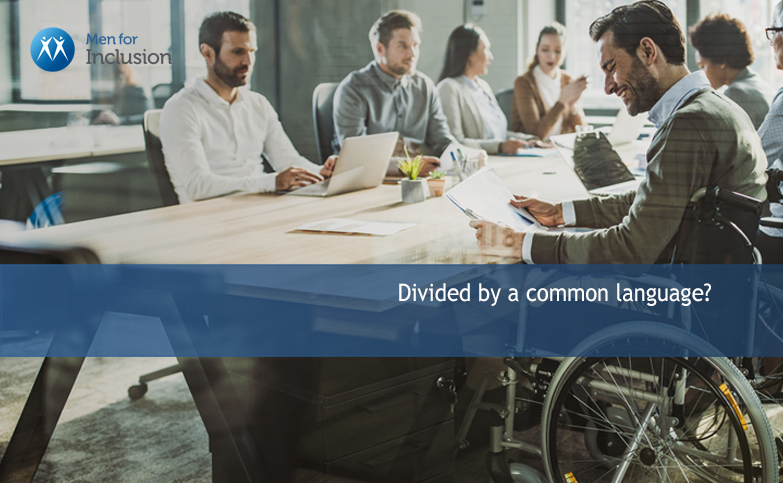
Divided by a common language?
Mark.Freed / 30 Apr 2021
Gary Ford - Men for Inclusion Co-Founder - Divided by a common language?
I witnessed an interesting exchange between two people on a diversity and inclusion workshop recently.
The interaction was about how people refer to themselves in terms of the demographic that people believe they are part of. One of them, a person with a disability, talked about how he was comfortable with the term I have just used, but did not like neither “disabled person” nor “wheelchair bound”.
Being called a “disabled person”, he felt, defined his disability as the primary context of who he was. And he didn’t like that definition. A “person with a disability” was better because it primary defined him as person…..who just happened to be disabled. This seemingly subtle difference had quite an impact on those of us in the discussion, as I don’t feel any of us had considered this differentiation before.
Similarly, he was quite surprised when one of our delegates described herself as “Brown” and talked about her dislike of the term BAME, which she felt was a label that was too generic and didn’t represent her specific lived experience.
This point about language and what is “right” and what is “wrong” is an interesting one. Because, clearly there is no right or wrong. And it is fascinating that people well acquainted with the issues affecting the diverse group that they identify with, are not always aware of the language of other diverse groups, despite the fact that they usually share a common aim – to make society more inclusive.
When running diversity and inclusion workshops, I frequently hear people say something like “I am not sure what I can say any more” or “I am worried about offending people”, particularly if they have never been part of that conversation before. Typically, we look to give people some ideas of language, phrases and words to avoid, but the more important part of the discussion is around being prepared to feel uncomfortable.
Because confronting difficult conversations and feeling uncomfortable, ignorant and not knowledgeable is the most important step. Being ready to let go of what you know and show the vulnerability to say to people you have never met before, “I don’t know” is tough, but necessary if you want to learn.
And when you do make a mistake, as you inevitably will, as we all do, it is ok to say “sorry, I will try to do better next time”. And hopefully, the people around you will accept that and be more prepared to help you. And not make you feel ignorant, unwelcome or in the wrong. Because, no-one is immune from making mistakes and making others feel uncomfortable because none of us have the direct lived experience of anyone other than us.
So, we will always be divided by a common language, but with a little empathy, vulnerability and curiosity to ask, we can all build a few more bridges to cross that divide.
Back to blog




 Women in Financial Services
Women in Financial Services